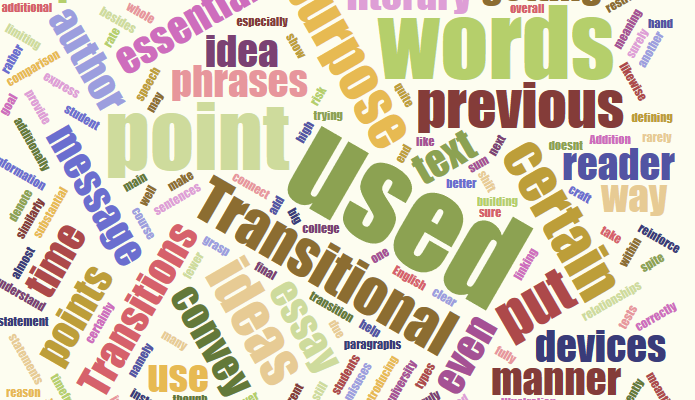What are the transitions and how are they used?
Publication Date:

English transitions are words or phrases used to connect a particular idea to the next one by linking phrases, sentences and even paragraphs. These essential literary devices help a reader better grasp the main point of the message, which the author is trying to convey. Transitional words are essential for building coherent relationships within the text or speech by introducing a certain shift.
Transitions are especially important for students who take essay tests at college or university. If the devices are used correctly, the likelihood of getting big points is high. If a student misuses transition words or doesn’t use them at all, the risk of getting fewer points may be quite substantial.
There are many different types of transitional words so before you use them, be sure that you fully understand their meaning and purpose.
Agreement / Addition
Used to express agreement, reinforce ideas and add information to the previous point.
- of course
- additionally
- and
- furthermore
- moreover
- besides
- too
- however
- as well as
Similarity
Used to show similarity or comparison between ideas or statements.
- similarly
- likewise
- equally
- identically
- in the same fashion / way / manner
- in like manner
Illustration
Used to provide an example or illustrate a point.
- for example
- for instance
- namely
- in other words
- specifically
- in particular
- such as
- to put it another way
- to illustrate
- in other words
- that is to say
- to put it differently
Time
Used to denote timeframes by limiting, restricting or defining them.
- after
- before
- formerly
- rarely
- finally
- eventually
- in the meantime
- subsequently
Emphasis
Used to put an additional emphasis on the point.
- above all
- indeed
- truly
- really
- certainly
- surely
Opposition / Contradiction
Used to introduce the evidence, which is contrary to the previous statement.
- on the other hand
- but
- although
- nevertheless
- rather
- however
- on the contrary
- at the same time
Concession
Used to concede a certain point in the essay.
- although
- at least
- even though
- in spite of
- at any rate
- still
Suggestion
Used to make a suggestion of a certain idea to the reader.
- for this purpose
- with this in mind
- therefore
- with this purpose in mind
- to this end
Effect / Consequence / Result
Used to demonstrate the consequence or effect of the previous point.
- for this reason
- as a result
- consequently
- therefore
- due to
- thereupon
- hence
- so
- under those circumstances
Conclusion
Used to summarize or restate the ideas outlined in the text.
- all things considered
- in summary
- in conclusion
- in essence
- overall
- on the whole
- in the final analysis
- to sum up
The goal of each writer is to convey his message clearly and concisely. Transitional words are the important elements that need to be used in almost every literary composition if an author wants to craft a clear, readable and coherent piece of writing.